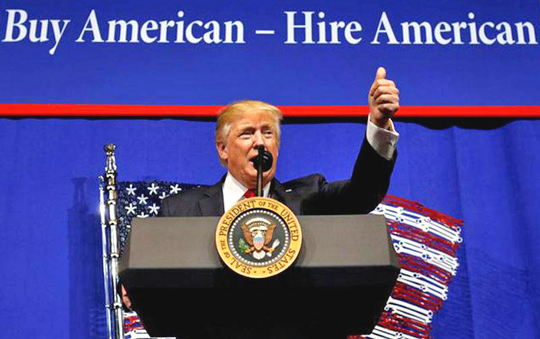Washington, Apr 19: US President Donald Trump issued an executive order on Tuesday curtailing the purported misuse of guest workers visa in a showy, populist, on-the-road gesture ostensibly aimed at protecting American jobs, a move that is expected to moderately affect the Indian infotech industry.

The order effectively raises the bar for foreign guest workers used by US and Indian companies to do work that American workers were thought to be unwilling or unable to do. Trump and his protectionist supporters say this is not true, and the original goal of the guest worker programme of bringing in highly-qualified foreign workers to do high-end jobs has been subverted by companies bringing in entry-level workers to replace US workers and depress wages.
In his first trip to the blue-collar country that voted for him in droves because of his pledge to protect US jobs, Trump went to a tool factory at Kenosha, Wisconsin, in the Chicago-Milwaukee industrial corridor (and Speaker Paul Ryan's district), to show he intends to live up to his promise to staunch the loss of jobs. There he signed what was called a double-barrelled "Buy American, Hire American" executive order that will tighten guest worker visas such as H-1B, and require American agencies to buy more goods and services from US companies and workers.
The executive order does not impose the moratorium on guest worker visas that Trump had called for during his presidential campaign, much less terminate or curtail the 85,000 H-1B visas every year of which Indians snag more than half. Instead, through a series of administrative recommendations, directives, and changes, including calling for an overhaul of the lottery system used to determine the metrics on which H-1B visas are sponsored, Trump hopes to eliminate what critics of the programme allege is a systematic abuse of the visa regime, particularly by Indian body-shopping companies.
Indeed, the order comes too late to affect this year's 65,000 20,000 H-1B visa quota, petitioning for which opened on April 3, resulting in a lottery that is already underway. The executive order is also not expected to affect other guest worker programmes, such as the H-2B seasonal worker visa used by US farms and agriculturists and Trump's own resorts. There is no word yet about the H-4 visa that allowed spouses of H-1B professionals to work in the US under certain conditions.
But the executive order takes aim at winnowing out poorly-qualified, less-skilled workers — many of them seeking immigration opportunities — of the kind India's mediocre engineering colleges churn out by the thousands, and who are brought into the US via dodgy immigrant-run colleges in America and body-shoppers who procure guest worker visas for them for entry level jobs.
US officials who briefed journalists on the background of the US president's executive order said 80 per cent of petitioners who enter the US under the current visa programme are paid less than the median wage for workers in their fields, suggesting that they not only displaced American workers but also undercut wages. They also maintained that the US graduates about twice as many STEM students each year as find jobs in STEM fields.
But Indian IT majors have contested many of these numbers and assumptions, while acknowledging that there may be a few dodgy body-shopping outfits that may have sullied the market, pointing out that more than 50 per cent of graduating STEM students in the US are from the immigrant/foreign-born pools, and populist measures cannot hide the genuine shortage of skilled workers for long. India's IT majors also challenge the allegations that H-1B workers are underpaid, saying US law forbids this.
"By law, we are an equal employment, equal opportunities employer. Even when we have expats coming into the country, their average salary is benchmarked to be higher than the 50th quartile, so, on an average, they get more than the average of the population. So the assumption that they are actually underpaid is factually incorrect, because they cannot be," TCS CEO Rajesh Gopinathan told PTI.
While some experts believe Trump's executive order could potentially allow more high-skilled foreign engineers to work in the US — although they will have to jump through the hoops to prove their skill levels given more rigorous certification requirements — others are warning that the upshot of the executive order will accelerate outsourcing.
"If you are not going to allow people to come in to do the jobs, then the jobs will go out where they can be done," another Indian industry executive who asked not be named said, while maintaining that the effect on the Indian IT industry will not be substantial.
TCS, Wipro, Infosys among Indian majors have embarked on major STEM education programmes in the US, working with colleges and high schools while employing more and more US citizens, to overcome the stigma arising from charges of displacing American workers.







Comments
Add new comment